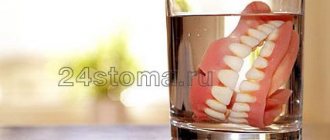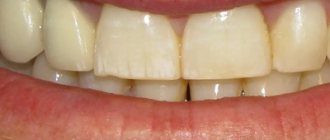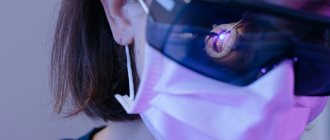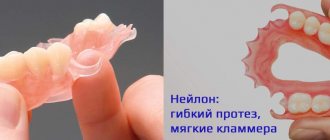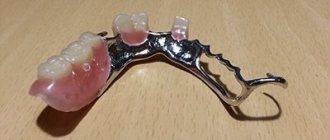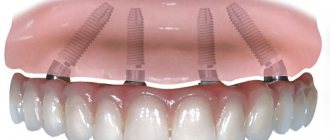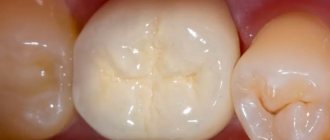May 3, 2019
When the question arises about how to restore a large number of teeth, many patients choose acrylic dentures. They can be completely removable (if completely edentulous) or partial (if only a couple of teeth are missing). What is the reason for their popularity? First of all, very attractive price. However, later many patients begin to complain that the structures cause too many problems. Some even admit that they still can’t get used to them. The editors of the UltraSmile.ru portal decided to help their readers avoid mistakes. We want you to be guided not only by the low cost of these structures, but also by useful information when choosing acrylic systems.
This is what acrylic dentures look like
How to quickly get used to removable dentures
Naturally, each person is individual, and the duration of adaptation directly depends on the model and materials of construction. Conventionally, the process of addiction can be divided into three stages:
- irritation stage, which lasts about 7-10 days,
- stage of conditioned inhibition (duration – 3 weeks),
- the stage of full adaptation, when the patient completely gets used to the new artificial teeth (occurs after 30-40 days).
Immediately after installation, removable dentures may cause you nausea, increased salivation, changes or complete loss of taste, and difficulty eating. Diction problems also occur. But as you get used to the design, all manifestations disappear completely or are reduced to a minimum.
“Of course, there are patients who cannot get used to any removable dentures, even if they are made perfectly and in exact accordance with the bite. For example, with an increased gag reflex or if there is initially no psychological mood. In such situations, you need to look for alternatives and the best solution is prosthetics on implants, which is hundreds of times more comfortable and does not cause such unpleasant sensations.”
Chorny Stanislav Vladimirovich, orthopedic dentist, work experience more than 16 years
Can't get used to removable dentures? Dental implantation will solve all your problems. In 1 day and forever. Lifetime guarantee on doctors' work.
Free consultation
During the period of getting used to the prosthesis, you need to wear it constantly, without removing it while eating and sleeping. You should not use it in case of acute pain - it is better to consult a doctor to correct the design.
It is important to understand that any removable denture, especially if it is installed for the first time, will require regular correction. The gums sag along with the bone tissue, the position of the joint changes, the bite is adjusted - all this will lead to the fact that the prosthesis will seem uncomfortable. One visit to the doctor and the position of the device will change - you will become more comfortable. Remember this and do not ignore your doctor's recommendations.
Fact No. 3: new generation acrylic structures are quite easy to use
Until recently, acrylic dentures were considered obsolete due to the shortcomings of the acrylic component. But reviews from patients and professional doctors suggest that acrylic has been improved and refined over recent years, thanks to which products made from it have an increased level of comfort and an optimal price-quality ratio.
For example, innovative clinics today create new-generation acrylic dentures in their own dental laboratories. Diamond chips are added to the material, due to which it acquires new positive properties: it becomes less porous, smoother and softer, comfortable and natural-looking. This material accumulates significantly less bacterial plaque (compared to classic porous acrylic); it retains its color, shine and original shade longer. When wearing such devices in a patient who carefully observes oral hygiene, the risk of developing inflammatory processes in the mucous membrane is minimized.
New generation designs are quite easy to use
Also today, orthopedic structures made from improved monomer-free acrylic plastics, for example, Acry Free, are also actively used for dental restoration. Products based on acrylic resins, compared to products made from pure acrylic, are more flexible and lightweight, up to 20 times stronger (not as fragile as acrylic), hypoallergenic (biologically inert), and non-toxic. Moreover, acrylic removable dentures "Acry Free", according to recent studies, reduce the time of adaptation to removable systems by 30-35 days, and slow down the process of jaw bone atrophy by 1.5 times2.
Read on the topic: the differences between the classic acrylic and the Acry Free prosthesis.
How to restore diction
To restore diction, it is recommended to speak as much as possible: read books, pronounce tongue twisters, while holding one or more sweets in your mouth (without sugar! For example, Sula with mint or sea buckthorn).
15-20 minutes, several times a day. The duration of the course is the first 1.5-2 weeks after prosthetics. Tongue twisters for restoring diction after removable prosthetics
| For your convenience, we have selected several useful tongue twisters |
| The snout pig was white-nosed, blunt-nosed; I dug up half the yard with my snout, dug, dug. |
| Karl stole Klara's advertising, and Klara stole Karl's budget. |
| In Kabardino-Balkaria, valocordin from Bulgaria. |
| The fast talker quickly said quickly, That you can’t quickly talk all the tongue twisters, but you can’t over-speak all the tongue twisters, But, having quickly spoken, he quickly said, That you can’t talk all the tongue twisters, but you can’t over-speak. |
In what cases is it necessary to contact a dentist?
If you notice a burning sensation in the mucous membrane, severe dry mouth, skin rash and other unusual symptoms, you should contact your dentist, who, if necessary, will refer you to an allergist for allergy tests.
Once a year it is necessary to reline the removable denture. The fact is that while wearing a prosthesis, atrophy of the mucous membrane and bone tissue occurs under it. Because of this, a void appears between the prosthesis and the mucous membrane and the prosthesis does not fit tightly to the prosthetic bed. To eliminate these negative aspects, the prosthesis is relined - plastic is placed in place of the void formed due to atrophy and a tight fit of the prosthesis is restored. If relining a removable denture is done at the wrong time or not done at all, the removable denture becomes unusable.
Visit your dentist at least twice a year, consult with him about the specifics of caring for your oral cavity, and use special devices and medications recommended by him, if necessary!
What hygiene products can be used
Hygiene products for the care of removable dentures
| Name | Description |
| Toothbrush | You will need a personal brush with soft bristles; too hard can lead to scratches in which bacteria will accumulate. We recommend the Curaprox brand – brushes with soft or ultra-soft bristles. They do not damage the plastic, but do an excellent job of removing plaque on the teeth, also cleaning it from under the gums. |
| Toothpaste | Low-grade, for example, Parodontax, ROCS To clean the prosthesis itself, you can also use children's paste - it is more gentle. |
| Irrigator | The device is necessary both for cleaning your own teeth, if they remain in the mouth, and for cleaning dentures - it effectively removes plaque and allows you to clean the interdental spaces very efficiently. |
| Citric acid and soda or tablets for cleaning and disinfection | Use for periodic cleaning and disinfection of structures - make solutions for rinsing the mouth or place dentures in them (applies to citric acid and soda). The tablets must be dissolved in water and the resulting solution must be used to soak the structure. |
Fact No. 1: acrylic often causes allergies and irritation of the mucous membranes
An acrylic denture is a removable device made of a synthetic polymer or cold-curing plastic, which contains quite a lot of residual monomers (on average 0.2%, but if the polymerization technique is violated, this figure increases to 8%). Monomers are toxic1, which is why those who wear acrylic devices are quite likely to develop allergies, allergic stomatitis, gingivitis, periodontitis, and even intoxication of the body. It should also be noted that the acrylic material itself is quite hard, which is why the prosthesis can rub the mucous membrane and injure it not only at the adaptation stage, but many years after the adaptation has passed, causing irritation and the appearance of ulcers. This is why some particularly sensitive patients cannot come to terms with the need to wear acrylic dentures.
The likelihood of allergies is quite high
Read the article on the topic: TOP 5 best manufacturers of acrylic dentures. How not to make a mistake in choosing and give preference to safe brands?
Some scientists claim that acrylic, which contains a large number of micropores, can cause the development of tumors in the oral cavity. Micropores are formed during the stamping of plastic and during its shrinkage. It is in them that during operation microbes become clogged, which gradually multiply and become the cause of the development of the inflammatory process.
What to do if the prosthesis rubs and does not fit well
- use ointments (Solcoseryl, Metrogyl Denta) or sea buckthorn oil. Apply the oil to the gums for a maximum of 20 minutes after eating and cleaning the denture 3-4 times a day,
- It is forbidden to sharpen dentures yourself, after which you can simply throw it away,
- If there is acute and constant pain caused by rubbing of the structure, you should consult a doctor for correction. 2-3 hours before the visit, the denture should be in the mouth so that the reason why the structure is rubbing becomes visible.
If the device is not fastened well, then you should contact your attending physician - an orthopedic dentist. If the correction does not help, you will have to use special fixation creams: Protefix, Corega, Lacalut Dent. Choose the one that suits you - according to taste, consistency, fixation time. Try different options and choose the best one.
Types of structures
There are two types of dentures: removable and fixed. Nylon and acrylic models are removed and can be cleaned with running water, preferably boiled. But it is better to clean with special solutions that are effective in getting rid of bacteria. They are purchased in pharmacies in ready-made form or in tablets dissolved in water. To fix such structures, glue, cream or strips are used.
These care methods also apply to partially removable structures, which include clasp models. Fixed veneers, implants, bridges, crowns require more careful care. Dental floss is used to clean hard-to-reach areas. Interdental brushes are also effective. You need to complete the procedure of cleaning from food debris by rinsing your mouth using special products.
How to eat after installing structures
If the prosthesis is made of comfortable materials, if it suits you, then you will be able to eat well right away. Restrictions occur when little time has passed after the removal of living teeth, when you initially had gum inflammation. In such situations, pressure causes pain; you need to limit the chewing load to avoid discomfort and allow the gums to recover.
In general, during adaptation it is advisable to adhere to the following recommendations:
- give preference to soft and warm foods, exclude viscous foods,
- you need to chew carefully and thoroughly, cut food into small pieces,
- It is better to chew food on the side where the process does not cause pain,
- You should refrain from biting food with your front teeth.
After adaptation, when the prosthesis no longer causes pain, you can return to your usual diet. But you should exclude foods that are too hard, viscous, sticky, excessively hot and cold (drinks and soups should be warm, ice cream should be kept a little at room temperature).
Indications for installation
Indications for installation of acrylic dentures are:
· edentia – complete absence of teeth;
· lack of one or more teeth in a row.
Acrylic dentures have no age restrictions. They can be installed not only by adults. Children need such structures in case of premature loss of baby teeth. In this case, the orthodontist recommends wearing an acrylic denture to avoid the appearance of malocclusion or crooked teeth.
Temporary structures are installed for adults while preparations are underway for another type of prosthetics. For permanent wear, acrylic dentures are used mainly by elderly patients.
How to clean dentures and remaining teeth
You need to brush your teeth exactly as you are used to: in the morning, in the evening and after every meal. But as for prosthetics, the recommendations will be as follows:
Daily care
- clean the structure in the morning and evening with a soft toothbrush using toothpaste without abrasives or regular soap (preferably baby soap). Pay special attention to the internal area that is in contact with the gum,
- Soak the denture daily in a solution of citric acid (1 teaspoon per 150 ml of warm water): soak it for 10 minutes to disinfect and loosen plaque. Carry out the procedure before brushing your teeth 2 times a day. Afterwards, rinse thoroughly with water. Change the solution every 3-5 days,
- after each meal, the structure is removed and thoroughly rinsed under running water,
- Additionally, you can use an irrigator, which will clean the microscopic gaps between the crowns of the structure,
- Be careful when brushing your teeth, especially if there are small parts - hooks, clasps, so as not to damage them.
Periodic care
- soak in a disinfectant solution - for this you need to purchase special tablets for removable dentures (Protefix, Corega, Lacalut Dent). Use up to 3 times a week while maintaining daily hygiene. Use according to instructions (keep in solution for 15-20 minutes),
- use products that suppress the activity of oral microflora (especially important several years after the installation of dentures, since more plaque accumulates on them). For example, “Tantum Verde” (spray, lozenges) - relieve inflammation and tension, freshen breath.
Modern equipment - ultrasonic sterilizers - can be used to disinfect dentures. They allow you to achieve ideal cleanliness of artificial teeth at home, cleaning them from bacteria and plaque. These devices can also be used to disinfect any other items - toothbrushes, baby bottles, etc.
Comments
Several front teeth are missing, and I want to install an acrylic denture, how will it be attached and will it damage the remaining teeth?
Anton (05/22/2019 at 12:04 pm) Reply to comment
- Dear Anton! For fixation in the oral cavity during partial tooth replacement, the acrylic prosthesis will have clasps (special hooks) that will cling to the supporting teeth. Such clasps can be made of acrylic or metal. Naturally, acrylic hooks will be more “inconspicuous” on the front teeth, although this material is still less beautiful and naturalistic than nylon. As for the supporting teeth, they will not need to be ground and prepared (as before fixing bridges), but it is important to understand that they will bear the main load from the prosthesis, so the “supports” can wear out and collapse faster than expected.
Editorial staff of the portal UltraSmile.ru (05.25.2019 at 10:20) Reply to comment
For some reason, I thought that metal ceramics are now the most popular for making dentures. It turns out that acrylic dentures are no worse (if there are no allergies, of course)?
Nastya (07/15/2019 at 10:06 am) Reply to comment
What are acrylic dentures? How effective will they be for an elderly person, for example, who does not have a single natural tooth? The most important question, of course, is what is the cost of acrylic dentures today?
Vasily (07/16/2019 at 06:06) Reply to comment
Will it be possible to install acrylic dentures if all the wisdom teeth (on the upper and lower jaws) were previously removed, because normal support will no longer be possible? Addition: anesthesia or anesthesia is used in this case.
Elena (07/16/2019 at 06:45) Reply to comment
What are acrylic dentures? Also, can acrylic dentures be used by a person who has constant gum inflammation? Expert advice is required on this matter.
Ulina (07/22/2019 at 07:15 pm) Reply to comment
What are the benefits of acrylic dentures in general? Also, if a person needs dental prosthetics, what recommendations could you give him in this case? How long will acrylic dentures last?
Denis (08/14/2019 at 04:11 pm) Reply to comment
How acrylic dentures are installed, I would like to clarify this information. Also, can acrylic dentures be used by a person who often has severe stomatitis?
Vasya (08/14/2019 at 04:55 pm) Reply to comment
Tell me, how generally are acrylic dentures considered in quality? How do they feel about hot food, for example, if a person takes hot food? Will acrylic dentures turn yellow over time?
Igor (08/15/2019 at 00:56) Reply to comment
Why does the doctor recommend choosing acrylic dentures in case of dental prosthetics? Why exactly are these prostheses in demand? Would you like to know more information about them?
Kitter (08/15/2019 at 00:59) Reply to comment
Why are acrylic dentures better than ordinary ones? If, for example, you urgently need to insert several lower teeth, as well as 3 upper ones. Will these acrylic prostheses be relevant in this case?
Roman (08/20/2019 at 04:43 pm) Reply to comment
I know that acrylic dentures are in good demand. So I’m wondering how much they will cost if you need to put on the top row of teeth? Also, who is not recommended for acrylic dentures?
Dorothy (08/20/2019 at 04:47 pm) Reply to comment
Write your comment Cancel reply
Do I need to remove dentures at night?
Modern “removers” can be worn constantly and it is not necessary to remove them at night – especially during the first 2-3 weeks, while adaptation to the designs occurs. However, outside the oral cavity, dentures with a plastic base should NOT be placed in a humid environment, since favorable conditions are created for the development and growth of pathogenic microflora. This can lead to bleeding and gum inflammation.
If there are metal elements, the prosthesis must also not be stored in tap water, especially chlorinated water - this can lead to metal corrosion.
For storage and transportation, it is necessary to use specially designed protective ventilated boxes/cases in which the prosthesis will be kept clean and dry.
Give up removable dentures forever! Consultation + diagnosis + treatment plan FREE. Find out which dental implantation method is right for you in 1 day!
Enroll now
Advantages and Disadvantages of Acrylic Prosthetic Devices
Similar to other prosthetic products, acrylic structures have a number of advantages:
- Probability of fixation on both a removable and partially removable base;
- Impeccable aesthetic parameters and the ability to choose the tone individually;
- Possibility of optimal distribution of pressure on gum tissue;
- Eliminates the need to use special expensive pastes and comply with special maintenance requirements;
- Easily removed from the mouth for cleaning and re-fixed quite easily;
- They are easy to repair – in case of a fracture;
- The key advantages of acrylic dentures include affordable prices.
Among the negative aspects of such prostheses are:
- Complete occlusion of the palate, which can provoke long-term adaptation and damage to the mucosa;
- There is a possibility of speech disorders;
- The porous structure of the material, due to which there is a need for frequent cleaning;
- There is a risk of allergization of the body due to the use of polymers. If the patient notices signs of an allergic reaction for more than two weeks, this indicates the need to visit the dentist to replace the structure.
Is it possible to whiten dentures?
If hygiene is insufficient, dentures may change their shade. But, unfortunately, it is impossible to bleach it to its original state, especially if a lot of plaque has accumulated and the coloring pigments have penetrated deep into the pores of the material. The doctor can perform polishing - the prosthesis will be smoother, its top layer will be a little ground off, so the structure will be visually lighter. At home, you can try using special whitening tablets (for example, Corega), but you should not overuse them - they can damage the prosthesis materials.
Nylon dentures
To preserve the properties of nylon structures for a long time, we must not forget about special care, otherwise the loss of their aesthetics and functionality and an unpleasant odor are guaranteed.
Caring for nylon dentures involves home and professional cleaning. When cleaning the house, nylon can be scratched if you use hard brushes. Therefore, it is recommended to acquire only soft models of brushes and pastes that do not contain abrasive substances. To protect against damage, they should be put on or taken off over a sink filled with water. You can fold a terry towel in several layers and carry out these manipulations over it.
Due to the fact that this material is capable of absorbing foreign odors and being stained by drinks and food, wearers of such prostheses need to disinfect them more often. For these purposes, dental nylon liquid, cleansing tablets such as Corega or ROCS are used.
To remove bacterial plaque from them that cannot be cleaned at home, an ultrasonic bath is used. The procedure is performed by a doctor in the clinic, where he also examines the gums under the structure. Thanks to the use of ultrasound, the surface gets rid of not only bacteria, but also coloring substances (nicotine) and tartar.
How to know when it’s time to change your dentures
It is recommended to change dentures every 3-5 years or 5-7 years (depending on the material and type of construction).
When using removable dentures, the load from chewing food on bone tissue is only insignificant, which is fraught with its gradual resorption. The jawbone decreases in size, and not always evenly. This process takes from six months to several years and leads to a discrepancy between the shape of the prosthesis and the relief of the gums - the prosthesis is less secure and becomes less stable. This means relocation (if possible) or complete replacement of the structure is required.
In addition, materials wear out over time under the influence of saliva, nicotine, food irritants, and mechanical stress. Cracks appear on the structure, the surface becomes less smooth, which contributes to the accumulation of a large amount of plaque. If you have chosen crowns made of plastic (namely, they are in most cases used in removable orthopedic devices), it is worth considering that they wear down quite quickly, so after about 2-3 years the bite changes, which can affect the condition of the joint and the process of normal chewing food.
Care products
Modern means for caring for dentures are varied and more effective than the old-fashioned solutions with soda and potassium permanganate, which will do more harm than good. They are specially designed for different types of structures, therefore they are absolutely harmless.
Care products can be fixative or cleansing. The most popular of them are fixing adhesives and creams. They contribute to a reliable fit of the prosthesis and redistribution of the load during chewing. It prevents food debris from getting under them and does not rub the gums, since the glue creates an airtight cushion. At night, the structure with fixing substances must be removed, this is the condition for their use.
Fixing powder is suitable for people with weak salivation. A thin layer of powder is applied to the structure, which is pressed tightly against the gums, creating an obstacle to food particles. And strips of special canvas for fixation are necessary if a person has an abnormal jaw structure.
Another common remedy is special tablets that dissolve in water. This solution can not only clean dentures, but also whiten them. True, they do not work on persistent nicotine stains; you will need the help of a dentist who will remove them with ultrasound. This needs to be done every six months.
Rinsing, cleaning, disinfection, professional care - these are the main components of the care process. And what means are used for them will depend on the specific model of prostheses.
Is it easy to get used to?
This aspect is one of the most exciting. Very often, in addition to installation, patients are also afraid of discomfort and changes in diction. No one wants to have many speech impediments that would immediately hint at the presence of removable dentures.
Nylon structures are much easier to get used to because of their softness and flexibility, but even they take some time to become part of the jaw and not cause any discomfort when chewing and speaking.
To quickly get used to it and regain normal abilities to chew and talk, you should train a little. It is better to start eating with small pieces and choose soft food. Large pieces should be cut into smaller ones and chewed very carefully. To restore speech, reading aloud is suitable. Pronounce the words carefully and over time normal diction will return. The main thing is not to worry and be prepared for some inconveniences. In just a little time, you will be able to use your new teeth calmly and comfortably, and those around you will not even realize that you have a prosthesis.
Manufacturing process of removable structures
Having understood the types and materials of removable dentures, you should become more familiar with the technology of manufacturing and selecting a denture. This process is quite simple and it begins with an x-ray.
After the photo is taken, an impression is made. Then it is sent to the laboratory, where prosthetics are made based on it. The creation process lasts about two weeks. The finished product needs to be tried on so that, if necessary, it can be adjusted and fit perfectly.
Modern dentistry has stepped far forward and began to use 3D modeling. Unlike older technology, which did not take into account the specific jaw structure of each patient, 3D allows you to make an anatomically accurate removable denture. This will protect you from curvature of your bite and reduce discomfort during adaptation to a minimum.
Pros and cons of manufacturing methods
The disadvantages of molding dentures by pressing (an outdated method) include, first of all, the need to obtain a plastic state of the molding mass by chemical means, which leads to the formation of free chemical active substances (free monomer) in the finished product. These substances have an irritating (allergic) effect on the body.
When pressing, the possibility of under-pressing is created, which leads to a violation of the closure of the teeth, the formation of excess (the so-called “burst”) material on the prosthesis in the cavity of the mold, and the need for polymerization.
To eliminate the noted shortcomings, molding by adding casting has now been introduced into the practice of denture technology.
Molding of acrylic plastics
For molding by casting with the addition of acrylic plastics, a number of devices have been created, made in the form of a syringe press and a special cuvette.
After fixing the cuvette in the clasp, slowly squeeze out the plastic using the syringe plunger into the cuvette. Approximately 10 minutes after filling the mold, the pressure is increased, the piston is secured in a compressed state and polymerization of the plastic begins. With the help of a spring available in a syringe press, the piston constantly presses on the mass and, therefore. its polymerization occurs under constant addition.
This method of molding and polymerizing the monomer-polymer composition provides a more compact material and reduces the shrinkage of the prosthesis by 0.25 to 0.5%, while using the pressing method the average shrinkage of the plastic is 5-7%.
The use of rigid and elastic base polymers and adherence to molding technology make it possible to achieve high-quality production of acrylic dental prosthesis that is safe for health.
Just CALL US!
+7
We will answer any of your questions and will definitely help you!
